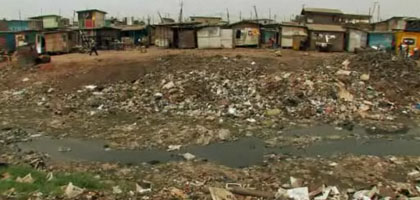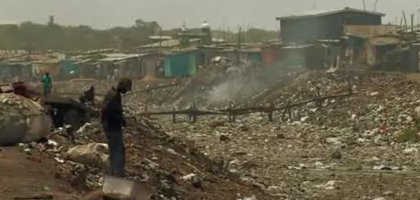ACCRA, GHANA — The air stinks of oil, fish and grease, only to be overtaken by that of garbage and sewage. It surrounds you as soon as you near Agbogbloshie, a neighborhood on the outskirts of this West African country’s capital city.
In most of Accra — a coastal city about the size of Philadelphia — open sewers carry little more than rainwater and a few pieces of debris in their troughs. In Agbogbloshie, even after a fresh municipal clean, a milky sludge sits in the sewers, alongside garbage left to dry on the road beside them, probably adding to the stink created by the town’s rambling landfill.
It is there, where many of Agbogbloshie”s children make a living looking for metallic scraps to be sold, that at least one printer from the School District of Philadelphia was found. It was shipped here as part of the growing practice of e-waste from wealthy nations being brought to developing countries, like Ghana. The printer, spotted in a PBS Frontline documentary exposing the e-waste trend and first brought to the fore locally by Technically Philly, created a call to action that has yet to be fulfilled.
City Controller Alan Butkovitz’s office pledged an investigation, and Fox 29 filed their own report, adding pressure to the school district’s vow for their own investigation. Yet three months later, the school district’s investigation is ongoing, says spokesman Vincent Thompson, and little has been resolved by the district itself.
The school district’s contract with Azon Computer and Electronic Recycling, who was handling their technology disposal at the time, did not actually require that the company recycle the equipment it removed from the district’s buildings, according to the city controller’s report.
After repeated calls by Technically Philly, Thompson declined to answer said he was unable to receive comment from the district’s IT department, due to the beginning of the school year, regarding several questions about the district’s current technology contract with Regentech, including how it differs from the one it had with Azon. Thompson didn’t say why Azon’s contract was canceled or discontinued.
Azon no longer exists as a company, and a spokesman for Regentech didn’t return a call for comment. It isn’t clear how Azon disposed of the equipment it removed from the district or how the printer ended up in Agbogbloshie’s landfill.
Thompson, too, declined to comment on the record if the school district had any intention of apologizing to the people of Agbobloshie for being part of the wave of e-waste, and its potentially toxic makeup, that flood their neighborhood.
“The School District can’t apologize if we don’t know if we’re responsible. The investigation is ongoing,” Thompson said in a followup call after this story was published. “We do not tolerate this kind of illegal dumping, that is for sure.”

Still, Agbogbloshie is more than smelly sewers and an infamous e-waste dump. A market, mostly supplied by items salvaged from the massive landfill and fed by Western leftovers, consists of uneven rows of stands lining the neighborhood’s main artery.
Most of the market isn’t quite like others along the southern coast of Ghana; instead of food and fabrics, sales consist more of old metal parts and batteries. Food vendors exist, but the majority sell what look like old car parts. The vendors pick the best of the dated pieces — especially PC terminals and boxy monitors — some looking worse for wear, others that seem fairly new.
Agbogbloshie doesn’t attract many tourists or foreigners generally. Accra market vendors tend to be much more aggressive than Americans are used to — calling, teasing, cajoling, even feigning offense, in order to make a sale. But in Agbogbloshie, the vendors give mostly half-interested glances to foreign faces, sometimes even seeming suspicious or apprehensive.
Only one school district printer was confirmed to have made it to this landfill, but the human and environmental cost of so many people accepting just one more computer becomes clearer the nearer one gets to Agbogbloshie.
-30-
Join our growing Slack community
Join 5,000 tech professionals and entrepreneurs in our community Slack today!
Donate to the Journalism Fund
Your support powers our independent journalism. Unlike most business-media outlets, we don’t have a paywall. Instead, we count on your personal and organizational contributions.

Half of Pennsylvania’s federal buildings are set to be sold under Trump admin plan

RealLIST Startups 2025: Meet 20 Philly startups hot on the track to success

Biotech startups are still winning federal grants, accelerator founder says — but the money is taking longer to trickle in

